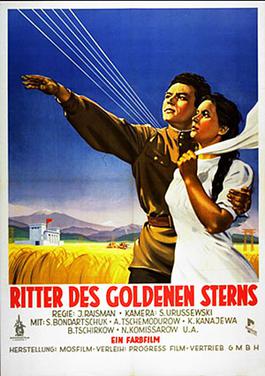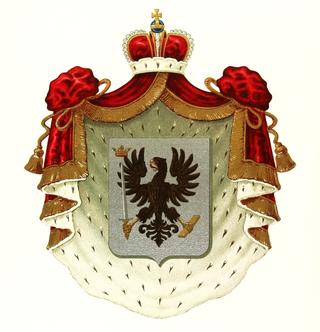Related Research Articles
Semyon Petrovich Gudzenko was a Soviet Russian poet of Ukrainian-Jewish origin, of the World War II generation. He is often compared with Pavel Kogan and Semen Kirsanov.

Pyotr Petrovich Vershigora or Petro Petrovych Vershyhora was one of the leaders of the Soviet partisan movement in Ukraine, Belarus and Poland and later a writer.

Ivan Petrovich Argunov was a Russian painter, one of the founders of the Russian school of portrait painting.

Archangelgorod Governorate was an administrative-territorial unit (guberniya) of the Tsardom of Russia and the Russian Empire, which existed from 1708 until 1780. Its seat was in Archangel (Arkhangelsk). The governorate was located in the north of the Russian Empire and bordered Siberia Governorate in the east, Kazan Governorate in the southeast, Moscow and Ingermanland Governorates in the southwest, Sweden in the west, and Norway in north-west. In the north, the governorate was limited by the White and Barents Seas.
Babayevo is a town and the administrative center of Babayevsky District in Vologda Oblast, Russia, located in the south of the district, on the Kolp River 246 kilometers (153 mi) west of Vologda, the administrative center of the oblast. Population: 12,073 (2010 Census); 12,604 (2002 Census); 14,211 (1989 Soviet census).
The Suicide is a 1928 play by the Russian playwright Nikolai Erdman. Its performance was proscribed during the Stalinist era and it was only produced in Russia several years after the death of its writer. Today it is regarded as one of the finest plays to have come out of Communist Russia.
The Milyukov family, also spelled Milukoff, Milukov, Melukov, Melukoff, is an old Russian noble family. Milyukovs were recorded in the ancient nobility books of Moscow, Orlov, Simbirsk, St. Petersburg, Tver, Yaroslavl, and Tula Governorates. In the 16th and 17th centuries, numerous Milyukovs were voivodes, falconers, stolniks, and gentleman of the bedchamber.

Dream of a Cossack is a 1951 Soviet drama film directed by Yuli Raizman based on the novel The Golden Star Chavalier by Semyon Babayevsky. It was entered into the 1951 Cannes Film Festival.

Komkor is the syllabic abbreviation for corps commander. It was a military rank in the Red Army and Red Army Air Force of the Union of Soviet Socialist Republics in the period from 1935 to 1940. It was also the designation for officers appointed to command a corps sized formation.

Vechernyaya Moskva is a Russian local newspaper published in Moscow since 6 December 1923 daily. It was founded as an organ of the Mossovet, later as an organ of the city committee of the CPSU and the Mossovet. Since 1990 it is published by the joint-stock company Concern 'Vechernyaya Moskva'.

How Czar Peter the Great Married Off His Moor is a 1976 musical film directed by the Russian filmmaker Alexander Mitta. The film features Vladimir Vysotsky as the protagonist Abram Petrovich Gannibal, the African godson of Peter the Great. Also starring in the film are Aleksei Petrenko as Czar Peter, and Irina Mazurkevich as Natasha Rtishcheva. It is an adaptation of the book The Moor of Peter the Great by Gannibal's great-grandson Alexander Pushkin, written in 1827 and published in 1837. The music for the film was written by the composer Alfred Schnittke. In 1976, the film was the sixth most popular film in the Soviet Union, being seen 33,100,000 times.

The Medal "For the Defence of Sevastopol" was a World War II campaign medal of the Soviet Union established on December 22, 1942 by decree of the Presidium of the Supreme Soviet of the USSR to reward the participants of the defence of the port city of Sevastopol against the armed forces of Nazi Germany and Romania. The medal's statute was amended on July 18, 1980 by decree of the Presidium of the Supreme Soviet of the USSR № 2523-X.
The following lists events that happened during 1978 in the Union of Soviet Socialist Republics.

Fyodor Mikhailovich Nikitin was a Soviet film and theater actor. People's Artist of the RSFSR (1969). Winner of two Stalin Prizes first degree.

The Forest is a 1953 Soviet drama film directed by Semyon Timoshenko and Vladimir Vengerov.

Sophia Stepanovna Razumovskaya was a Russian courtier. She served as maid of honour to empress Catherine the Great. She was married to Peter Kirillovich Razumovsky, and the mistress of Paul I of Russia prior to his marriage, with whom she had a son, Semyon Veliky (1772–1794).
The 17th Mechanized Corps was a mechanised unit of the Red Army. Formed in March 1941, the corps was destroyed in the Battle of Białystok–Minsk and reduced in size to the 147th Tank Brigade.

Semyon Petrovich Uritsky was a Soviet general. He fought in the Imperial Russian Army during World War I before going over to the Bolsheviks. He was promoted to the rank of Komkor on November 11, 1935. He was a recipient of the Order of the Red Banner. He was head of the Soviet military intelligence from April 1935 to July 1937. During the Great Purge, he was arrested on November 1, 1937 and later executed at Kommunarka. He was rehabilitated in 1956. He was a nephew of Moisei Uritsky.

The Lyapunov family is a Russian noble family claiming descent from the Galich Rurikids, who lost their princely title in the 15th century. The family later served the archbishop of Veliky Novgorod, and subsequently integrated into the Ryazanian nobility.
References
- ↑ "Semyon Petrovich Babayevsky". www.krugosvet.ru. Retrieved 2012-12-01.